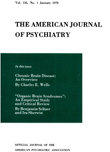A SEARCH FOR THE AFFECTIVE DETERMINANTS OF CHRONIC URTICARIA
Abstract
1. Medical study of 40 patients failed to produce evidence of an allergic mechanism or a causative physical agent in the etiology of their chronic urticaria. 2. Chronic urticaria may be viewed as a regressive, physiological expression of unconscious conflict when previously operating mechanisms of defense have become inadequate to bind strong affect. Anxiety is the dominant affect in this disorder. 3. Regression from a predominate action level of tension discharge to an organ level of expression is dynamically crucial to the formation of chronic urticaria. 4. The prime affective force in chronic urticaria stems from a revival of abandonment fear and companion rage, called up in a state of helplessness engendered by a particular set of life circumstances. 5. The conversion process offers the most satisfactory explanation for the physical reaction of chronic urticaria among the patients in this series.
Access content
To read the fulltext, please use one of the options below to sign in or purchase access.- Personal login
- Institutional Login
- Sign in via OpenAthens
- Register for access
-
Please login/register if you wish to pair your device and check access availability.
Not a subscriber?
PsychiatryOnline subscription options offer access to the DSM-5 library, books, journals, CME, and patient resources. This all-in-one virtual library provides psychiatrists and mental health professionals with key resources for diagnosis, treatment, research, and professional development.
Need more help? PsychiatryOnline Customer Service may be reached by emailing [email protected] or by calling 800-368-5777 (in the U.S.) or 703-907-7322 (outside the U.S.).



